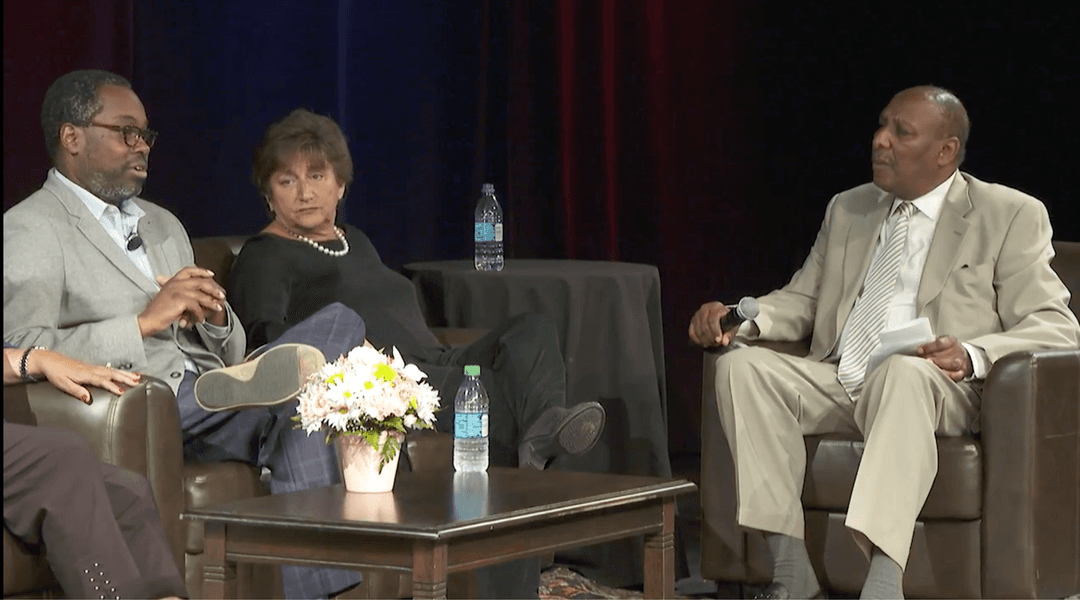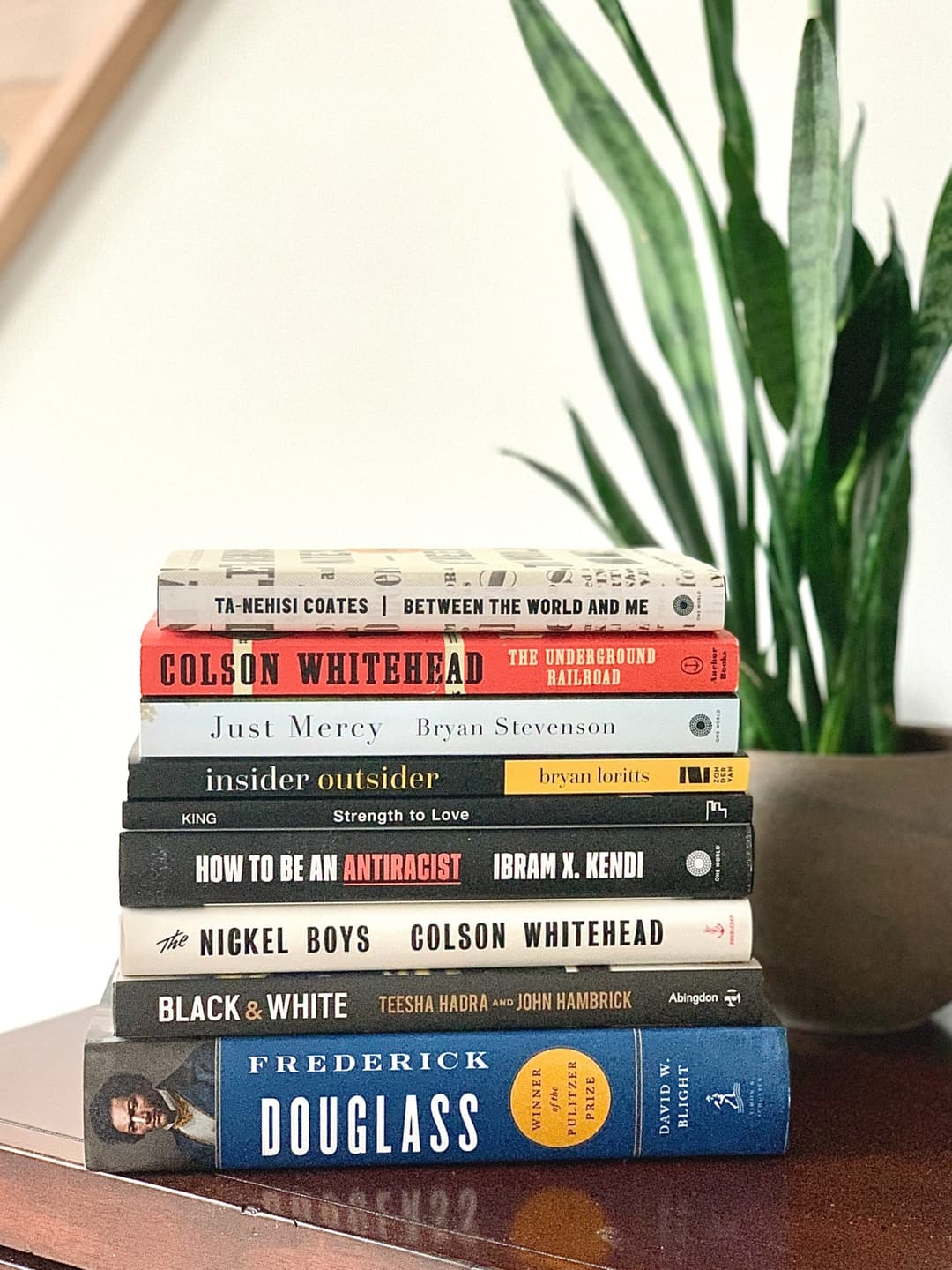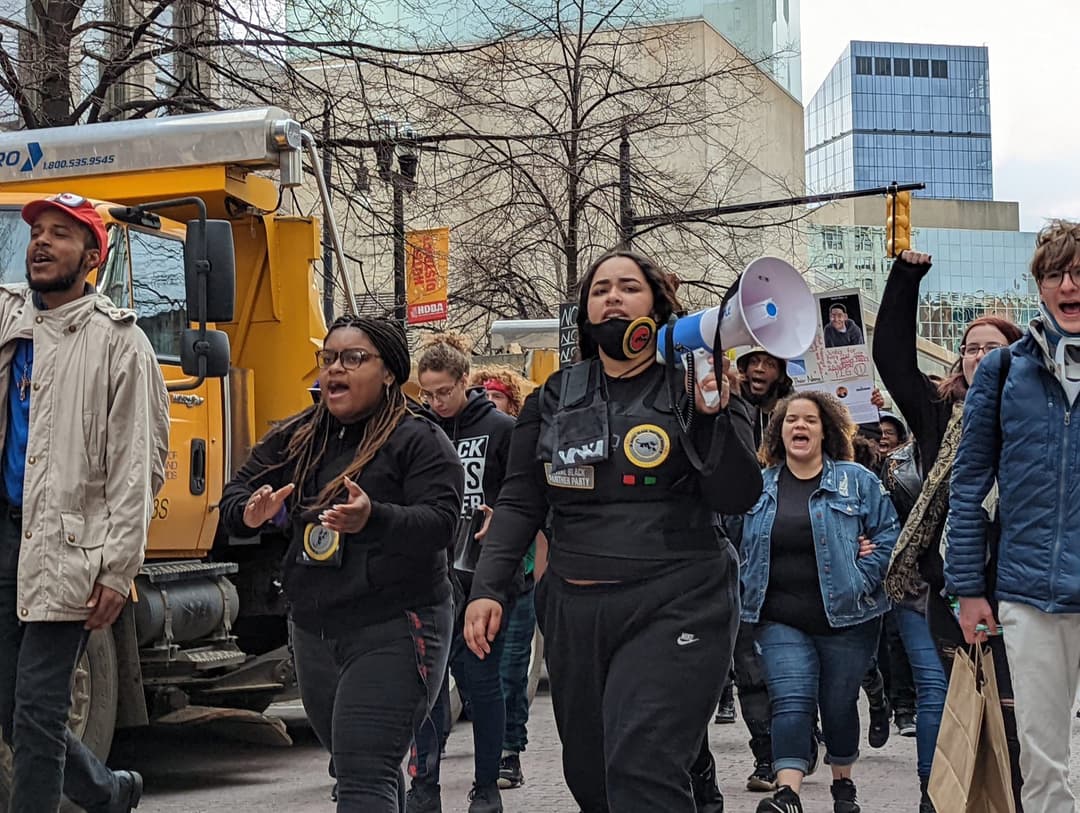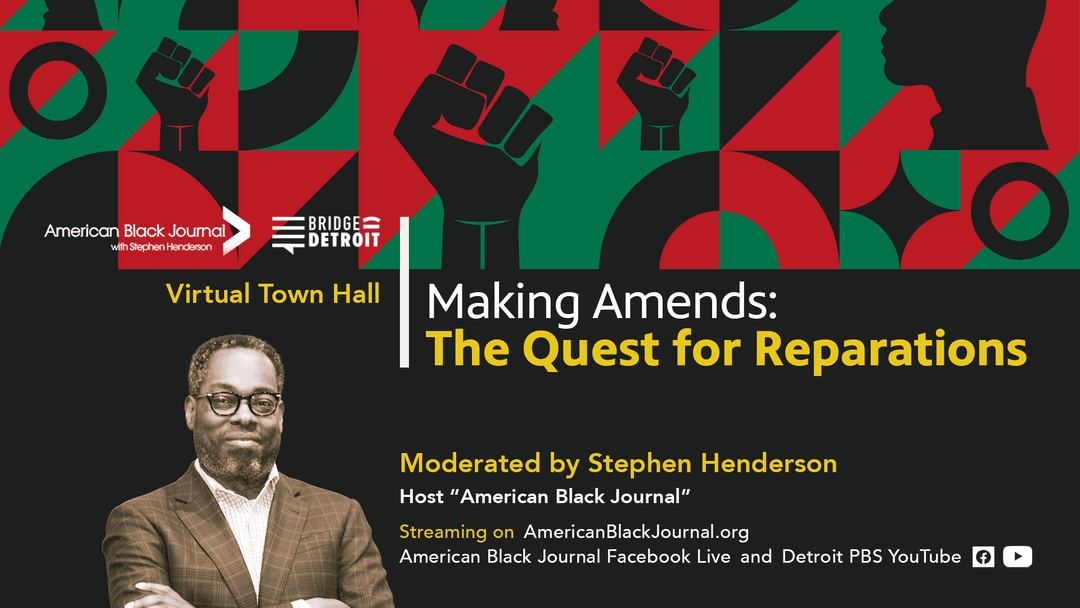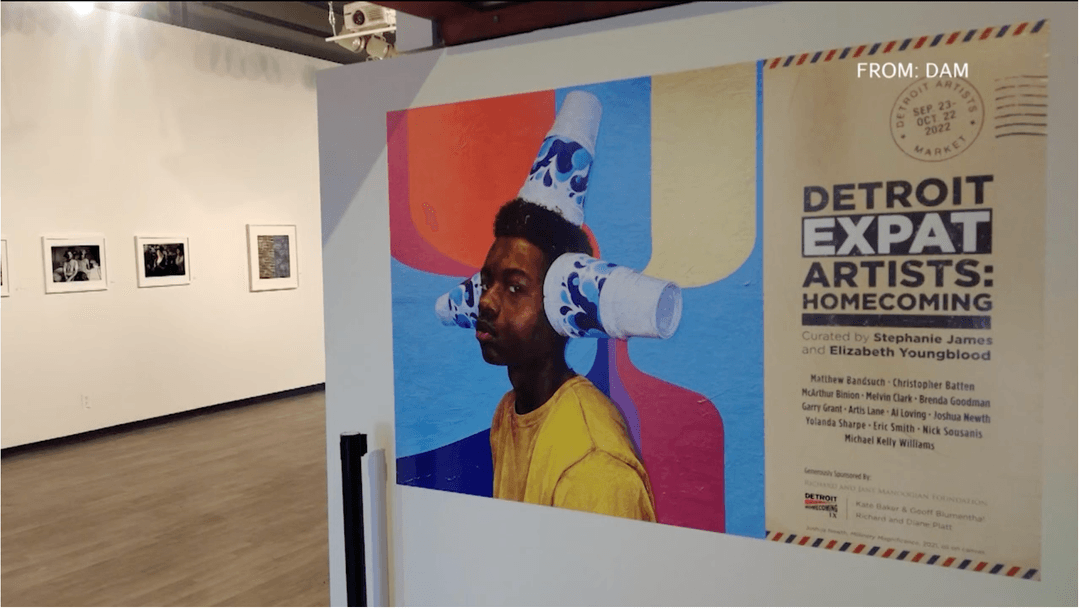Detroit Chapter NABJ Celebrates 40th Anniversary With Yearlong Slate of Events
Sep 7, 2022
It’s time to celebrate. The Detroit Chapter of the National Association of Black Journalists (NABJ), an organization of metro Detroit journalists, students and media professionals that champion diversity in newsrooms and the content that’s produced, has announced a yearlong slate of events to celebrate the association’s 40th anniversary.
Founded in December 1982, the Detroit Chapter NABJ will commemorate the 40th anniversary by recognizing the chapter’s founding members, and “in keeping with tradition,” as the nonprofit’s website says, the yearlong celebration concludes with a celebrity roast honoring WXYZ-TV Editorial Director Chuck Stokes.
Filling in for Stephen Henderson, guest host Trudy Gallant-Stokes speaks with Nicole Avery Nichols, co-chair of the 40th Anniversary Celebration and the editor-in-chief at Chalkbeat, about the events planned for the Detroit Chapter NABJ’s milestone. Plus, they discuss the history of the NABJ, the importance of diversity in media, and their plans for a newly created youth scholarship program.
Full Transcript:
Rochelle Riley, Director, Arts & Culture City of Detroit: Today we stand in the museum that bears Mr. Banks’ name to celebrate our history, the history of the Detroit Chapter of the National Association of Black Journalists, who have had the consummate job of covering a predominantly Black city for the past 40 years.
Vincent McCraw, Chapter President, Detroit NABJ: Through these 40 years, we have done wonderful things. We’ve not only stayed true to our core mission of advocating for Black journalists and media professionals in metro Detroit, which has not only included offering them programming, but it’s also included coming into some of the newsrooms here to talk to management about issues affecting our members. Sometimes those conversations have been tough, but they’ve been productive, and we like to think fruitful.
Mayor Mike Duggan, City of Detroit: As you all know, in many cases, Black journalists have great passion for journalism itself, but they oftentimes have great passion for the community. And that comes through in your work, and it makes you the kind of person to be able to spend part of your career telling the story and part of your career shaping the story.
Trudy Gallant-Stokes, Guest Host, American Black Journal: The Detroit NABJ will hold a gala and silent auction as part of the anniversary festivities. The organization also plans to award several scholarships to the next generation of journalists as part of its commitment to Black excellence.
Darren Nichols, Former Chapter President, Detroit NABJ: We are a great organization to be a part of. We do a lot of internships, we do a lot of advocacy. We do a number of different things within the community, and we are on the front lines for journalism in the African American community.
Miranda Bryant, Member, NABJ: For our diversity to be included in the media means so much to me. When I go into the newsroom and I see people who look like me, it makes me feel comfortable.
Greg Dunmore, Co-Founder, Arts & Entertainment Taskforce NABJ: When I see the future of the NABJ is to continue to encourage us to celebrate who we are so we can tell the stories that must be told from a unique perspective that comes from the richness of who we are as Black people.
Trudy Gallant-Stokes: Nicole Avery Nichols is one of the co-chairs for the Detroit NABJ 40th anniversary celebration. I spoke to her about the organization’s plans for the coming year, as well as its legacy providing services and programs for Black journalists.
Trudy Gallant-Stokes: Nicole, so great to see you.
Nicole Avery Nichols, Co-Chair, Detroit NABJ 40th Anniversary Celebration Editor-in-Chief, Chalkbeat: Great to see you, also. So excited to have the opportunity to speak with you.
Trudy Gallant-Stokes: So I don’t even know if you know this, but I actually met Chuck. My husband, at an NABJ conference, a regional. So this organization has long been near and dear to my heart. So take us back 40 years. How did things get started? And then we’ll come to the present and all the exciting things that are going to be going on.
Nicole Avery Nichols: Yes. So I just have to say also Trudy, that I met my husband, Darren Nichols, also through NABJ right here in Detroit on my first day of work at the Detroit News. So we have that in common.
Trudy Gallant-Stokes: A lot of media families in this community.
Nicole Avery Nichols: Absolutely, absolutely. So we are so thrilled and excited to be celebrating 40 years of Black media excellence here in Detroit. The chapter was founded in 1982. Right. So that’s decades of really, really pouring in to this rich media landscape. And it’s one of the early, Detroit is one of the earlier chapters. It’s one of the biggest chapters across the country. You know, we’ve had our ups and downs and our triumphs. But what we do have is just a legacy of folks who have come through this area.
Lots of African American firsts, lots of success stories have come through Detroit. And those of us who came after I’m looking at myself in this market. I said I met my husband on my first day of work in 1997. So that’s two decades or so working in Detroit media. Those of us who came to Detroit from other places have really benefited from the work of Detroit, NABJ and its members all along in metro Detroit. So we are so thrilled to share this year and next year, more of our history.
Trudy Gallant-Stokes: So who are some of the founding members, people that people may be familiar with from back in the day?
Nicole Avery Nichols: Well, those are things that we’re working on now and doing some research and reconciling. We are, Ken Coleman is our resident historian and he’s working on a project. It’s not that we’re trying to keep it under wraps, but we would really like to roll this project out starting in September, where we highlight some of these key moments in Detroit, NABJ history. We want to talk a little bit about the founders. We want to talk a little bit about, some of the firsts in this area. We plan to do that twice a month all the way from September until February. And we are working with these things will be posted on our site, detroitnabj.org.
Nicole Avery Nichols: And we are working with a local media partner on this. So you’ll be hearing more about that as soon as we have that relationship formalized.
Trudy Gallant-Stokes: Exciting. That’s something for everybody to look forward to. People, you hear about organizations like this, but I don’t know people understand the significance and the support that an organization like the National Association of Black Journalists, particularly going back 40 years ago there weren’t that many African Americans in the business.
Trudy Gallant-Stokes: So to have that camaraderie and that support, what would you say was the biggest impact in the early days?
Nicole Avery Nichols: Right. So I would say that I totally agree with the framing of this question and what you’ve shared there. And I think that that is something we should talk more about. We all know that media is, can be fickle and it can be extremely hard for communities of color to make inroads into media. After the murder of George Floyd, we had what some might call a racial reckoning in this country. But those of us in media have seen this several times before, where we start talking about opportunity and diversity and equity and these things are on the top of everyone’s mind.
But those of us who’ve worked in media for a long time, like those NABJ members who started 40 years ago, 30 years ago, know that these same conversations were happening back then. And what an organization like Detroit NABJ does is make space. Right? So you have a built-in mentorship group. You have a built-in advocacy group, right? A lot of time is spent advocating for African American journalists and Black communities, advocating to media companies for the recognition of issues that impact communities or the way communities are portrayed in media.
You have mentoring, you have coaching, you have lifelong relationships through these organizations that enable and empower, right? And pour into its media members and give them the strength to walk into these spaces that oftentimes are not friendly and are not really set up to accommodate or recognize those journalists and their life experiences.
Trudy Gallant-Stokes: Absolutely. So, as you mentioned, George Floyd is an example of a news story in recent years. But I’m thinking all the way back to Rodney King and things like that. What were some of the other milestone news stories that really changed the way people looked at what journalists have to do?
Nicole Avery Nichols: Right. So, you raised the touchstone for my generation. I’m a generation X journalist. So before George Floyd, for me, it was Rodney King. As a New Yorker, it was the teenagers, the young kids who were accused in Central Park.
And unpacking some of how the media swarmed on those children. And didn’t tell a fuller story or didn’t attempt to just take whatever the cops were saying and the people in power were saying at face value. That indicates as things like Malice Green etc., here in Detroit, the ’67 riots in Detroit. And how or the uprising, as we would say. Those things indicate the need for diversity of voice, diversity of lens.
And oftentimes what we see in media is when these things come to fore, come to bear, then you have doors open and more diversity. Right. But what happened in the 20 or so years between Rodney King’s situation and the George Floyd situation in media… How I experienced it as a media member first starting at the Detroit News and then moving on over to the Free Press was a shrinking. You know?
Trudy Gallant-Stokes: Yeah.
Nicole Avery Nichols: Yeah. A shrinking in terms of how diverse our staffs looked like.
Trudy Gallant-Stokes: Absolutely. So we’re already into our last couple of minutes, and I want to make sure that we highlight the wonderful things that are going to be happening throughout this year-long celebration. So just give us a few highlights. You’ve already given us that one tidbit, which is exciting that we’ll be getting these historical pieces. So what else will be going on?
Nicole Avery Nichols: Yes, you’re going to want to definitely plug into our website, detroitnabj.org. We will be doing the history facts there as well. But starting on September eighth, we’re launching what we call our If You Came Through, Come Through campaign, right? If you came through Detroit, come through for our scholarship fund.
This is all about, these efforts are all about celebrating but also giving back. We plan to give an unprecedented amount of scholarship dollars this year. Our target is 10. We’re seeking to raise $40,000 thousand dollars. So starting on the eighth, our T-shirt campaign will launch on our website. It’s $50 for any journalist who’s come through Detroit. They have an opportunity to get their name on this commemorative garment. And we have a few more surprises in the fall.
Nicole Avery Nichols: However, the pinnacle, the marquee event that we’re planning, we’re thinking in spring 2023 is our gala roast. And we will be honoring and roasting the legendary Chuck Stokes.
Trudy Gallant-Stokes: Awesome. It’s wonderful. He’s looking forward to it. He’s very excited about it and I think it’ll be a lot of fun for a fabulous cause.
Nicole Avery Nichols: Absolutely. And, we are really serious about our journalism. We really pour into our newsrooms, broadcasts, our public relations business, etc., but we also like to laugh and have fun. So we are just so thrilled that Chuck is going to take this journey with us. And we will, we are working on a date. We’re looking for sponsors. All of that information will be up on our website.
Stay Connected:
Subscribe to Detroit PBS YouTube Channel & Don’t miss American Black Journal on Tuesday at 7:30 p.m and Sunday at 9:30 a.m. on Detroit PBS, WTVS-Channel 56.
Catch the daily conversations on our website, Facebook, Twitter and Instagram @amblackjournal.
View Past Episodes >
Watch American Black Journal on Tuesday at 7:30 p.m. and Sunday at 9:30 a.m. on Detroit Public TV, WTVS-Channel 56.
Stay Connected
Subscribe to Detroit PBS YouTube Channel & Don’t miss American Black Journal on Tuesday at 7:30 p.m. and Sunday at 9:30 a.m. on Detroit PBS, WTVS-Channel 56.
Catch the daily conversations on our website, Facebook, Twitter, and Instagram @amblackjournal.
Related Posts
Leave a Reply
Your email address will not be published. Required fields are marked*





